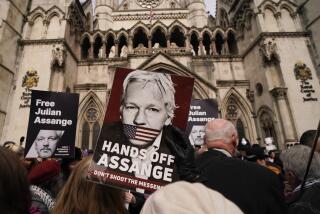Tyrants, Hear This
- Share via
Regardless of the final outcome in the case against former Chilean dictator Augusto Pinochet, whose extradition from Britain is being sought by Spain, Britain has taken a precedent-setting course honoring the law and advancing global human rights.
A decision last week by the Law Lords, Britain’s highest court of appeal, greatly reducing the charges brought by Spanish Judge Baltazar Garzon against the dictator, made some human rights advocates unhappy. But legally it was the correct choice.
When Garzon made his case against the old tyrant he included atrocities committed over the duration of Pinochet’s bloody dictatorship in Chile, from 1973 to 1990. Thousands of people were kidnapped and murdered by government forces. Among them were dozens of Spanish citizens, which gave Spain its basis for trying to put Pinochet on trial. Pinochet was arrested in London last fall, at the request of Spain.
The case rests on two questions: Can a former head of state claim immunity from prosecution for crimes committed during his rule? And does an international convention signed by many countries--in this case including Britain, Chile and Spain--provide legal grounds for extradition? In its 6-1 decision, the panel of judges rejected Pinochet’s claim of immunity but limited the case to crimes committed after Sept. 29, 1988, the date when more than 100 nations signed the International Convention Against Torture. Garzon, the Spanish judge, responded by issuing a court document saying he has evidence of torture and murder during Pinochet’s rule after 1988.
It is now up to British Home Secretary Jack Straw to decide the extradition. But whatever Straw’s decision, the Law Lords’ ruling has sent a message to tyrants that there are fewer places to hide and that there is a global mechanism for pursuing them. This is a development that advances the rule of law.
More to Read
Sign up for Essential California
The most important California stories and recommendations in your inbox every morning.
You may occasionally receive promotional content from the Los Angeles Times.













